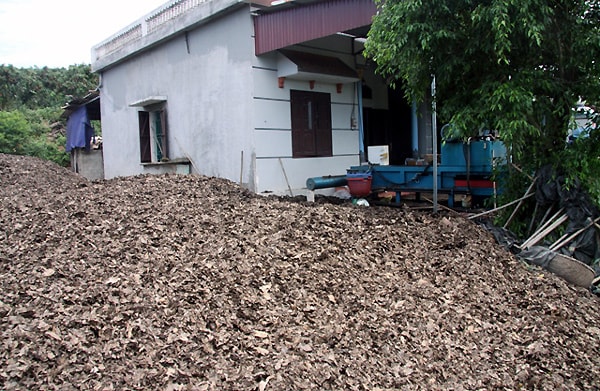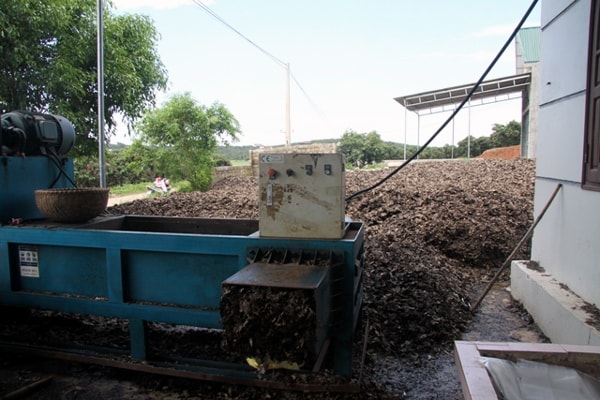Mystery of the speculator who sold hundreds of tons of lychee leaves to foreign countries
While the lychee season in Luc Ngan is only in the middle of the season, many businesses are already looking to buy... lychee leaves to compost and sell to foreign traders.
Contrary to many rumors of a period of time, Chinese traders, after purchasing the entire lychee season, switched to "sweeping" lychee leaves and branches... from Luc Ngan, Bac Giang to bring back to the country.
The purpose of buying lychee leaves is still a question for many people, and it also makes many people confused and suspicious. Even the people of lychee land, when asked, all shook their heads and did not know the reason.
People who transport lychee to agents these days say that during the lychee season, all the workers and family resources are focused on picking the fruit, so they don't have time to... collect lychee leaves.
Almost every family has to hire 4-5 workers to pick lychees. The homeowner’s only responsibility is to transport the lychees to the dealers to weigh and sell.
 |
| Mr. Nguyen Van Quy's family in Chao Mao hamlet, Phuong Son commune (Luc Ngan, Bac Giang) has more than 100 lychee trees. His family's total lychee growing area is more than one hectare of hilly land. |
This year, the lychee crop was good. One lychee tree of his family yielded about a quintal, 20-30kg/tree more than last year.
One morning, four workers gathered to pick and bundle lychees... and could only collect 4-5 plants, which equaled two baskets for two loads.
With the price of lychee purchased by agents ranging from 7,000-10,000 VND/kg, a basket of lychee weighs more than a quintal, Mr. Quy's family earns nearly one million VND.
Pointing to the vast lychee garden stretching from the edge of the red dirt road connecting the communes from Phuong Son to Quy Son, Mr. Quy said: “Look there, the lychee leaves have fallen all over the garden. After harvesting all the fruit, we have time to sweep the leaves and sell them to the lychee leaf purchasing points.”
Until now, people often think that traders will buy fresh lychee leaves in bundles and then sell them to the exporter (mostly Chinese traders).
“They buy them and let them rot before selling them. Therefore, selling dried lychee leaves will fetch a higher price.”
Currently, one kilogram of lychee leaves costs 1,000 VND/kg. Instead of burning them, many people collect them and sell them to have more money to buy fertilizer and pesticides to invest back into the lychee trees.
l
 |
| Machine presses fabric leaves into cakes for packaging. |
In Quy Son commune (Luc Ngan district), people are familiar with the collection point of a large quantity of lychee leaves of Mr. NVH's household - a resident of the commune.
Mr. H. gathered the lychee leaves he bought on an empty land of thousands of square meters. It took him quite a long time to collect a few dozen tons of leaves.
Currently, Mr. H.'s lychee leaf field is nearly one meter high and several dozen meters long. All of it has been composted, almost rotten, just like how farmers compost green manure to fertilize their fields.
Mr. H. said: Composting lychee leaves to make them rot is not complicated or difficult. The lychee leaves are piled up, then watered and pumped into the compost. They will self-seal, ferment and decompose. At a certain stage, when they reach the level of rot according to the buyer's criteria, they will be packed into plastic bags and exported by... container.
For fresh lychee leaves, if not composted, they must be chopped, watered to rot quickly, and packaged in the same way.
To deal with hundreds of tons of rotten lychee leaves due to long-term composting, Mr. H. had to hire dozens of workers to live at his family's house.
“We don’t export lychee leaves to Chinese traders, but the buyers are Japan. Over there, they research and grow clean vegetables and fruits in greenhouses. The composted lychee leaves collected are probably used to produce bio-fertilizer and organic fertilizer to fertilize plants,” said Mr. H.
As evidence for the story, Mr. H. showed me a catalog written entirely in Japanese, which introduced pictures of the processes of growing and raising... vegetables and fruits.
“In Luc Ngan, there are three or four large-scale factories that buy lychee leaves, compost them, and then package them for export to Japan. My family’s scale is only moderate,” said Mr. H.
The Japanese side invested in Mr. H's family a production line of cutting, pressing, and compressing machines to pack rotten fabric leaves into nylon bags. A tightly pressed nylon bag weighs 25kg.
Informing VietNamNet, Mr. Nguyen Manh Ha, Head of the Economic Infrastructure Department (Luc Ngan District People's Committee) confirmed: those who buy lychee leaves all report to the local authorities and the District Farmers' Association so that the Association can notify lychee growing households.
“The purchase of lychee leaves does not affect the production and development of Luc Ngan’s special tree, because the productivity of lychee trees even increases every year. No one is foolish enough to strip all the lychee leaves to sell.”
Mr. Ha analyzed: a lychee tree, if all the leaves are stripped, can yield about 10kg. The selling price of lychee leaves is 1,000 VND/kg, which is nothing compared to a kg of lychee fruit.
When asked why traders only buy lychee leaves and not leaves from other plants, Mr. Ha commented: "Maybe because lychee leaves have a lot of organic matter and high humus content... so they buy them to produce clean fertilizer."
Thus, the speculation and confusion of many people who doubted that Chinese traders came to buy lychee leaves to... destroy lychee trees has been resolved!
According to Vietnam.net






